
Crime Science
Scope & Guideline
Exploring the complexities of crime through innovative research.
Introduction
Aims and Scopes
- Crime Analysis and Prediction:
The journal emphasizes the use of statistical models and data analysis techniques to predict crime trends and patterns, often utilizing advanced methodologies such as Bayesian models and machine learning. - Impact of Societal Factors on Crime:
Research frequently explores how societal changes, such as public health crises (e.g., COVID-19) or environmental factors (e.g., urban heat islands), influence crime rates and types of criminal behavior. - Technological Applications in Crime Prevention:
There is a consistent focus on the role of technology in crime prevention and investigation, including the use of algorithms, GPS data, and digital tools to enhance police effectiveness. - Behavioral Studies of Offenders and Victims:
The journal includes research on the psychological and social dynamics of crime, examining factors that influence both offenders' actions and victims' experiences. - Policy and Practice Implications:
Research findings are often linked to practical implications for law enforcement and public policy, aiming to inform and improve crime prevention strategies.
Trending and Emerging
- Impact of COVID-19 on Crime:
There is a marked increase in studies examining the effects of the COVID-19 pandemic on crime trends, including changes in criminal behavior and the implications for policing and public safety. - Cybercrime and Digital Offenses:
Research on cybercrime, including topics like online abuse, identity fraud, and the implications of digital technologies in crime, is gaining prominence as society becomes more digitally interconnected. - Environmental and Contextual Factors:
Emerging studies focus on how environmental factors, such as urban design and climate conditions, affect crime rates, highlighting the importance of context in crime analysis. - Intervention Strategies and Effectiveness:
There is growing interest in assessing the effectiveness of various intervention strategies, particularly those that leverage behavioral insights and technology to prevent crime. - Victimology and Support Systems:
Research on victim experiences, particularly in the context of technology-facilitated crimes and support systems for victims, is increasingly relevant, reflecting a broader understanding of crime's impact.
Declining or Waning
- Traditional Crime Types:
There is a waning interest in research solely focusing on traditional crime types such as burglary and theft, likely due to the emergence of new crime challenges, particularly in the digital space. - Rural Crime Studies:
Research specifically centered around rural crime has become less frequent, possibly overshadowed by urban crime studies and the complexities introduced by urbanization and technological advancements. - Static Crime Prevention Strategies:
The focus on static or traditional crime prevention strategies appears to be declining, as researchers increasingly explore dynamic and adaptive approaches that respond to evolving crime patterns.
Similar Journals
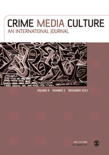
Crime Media Culture
Unraveling the Threads of Crime in Media NarrativesCrime Media Culture is a leading academic journal published by SAGE Publications Ltd, dedicated to exploring the intricate interplay between media representations of crime and societal perceptions. Established in 2005, this journal has become a cornerstone in the fields of Cultural Studies, Law, and Communication, consistently ranking in the top quartiles within relevant categories, including a Q1 ranking in Arts and Humanities (miscellaneous) and Cultural Studies for 2023. The journal offers a platform for interdisciplinary research that addresses the critical implications of media narratives surrounding crime, appealing to researchers, professionals, and students alike. With a strong focus on contemporary issues, it provides insightful analyses and discussions that contribute to the evolving discourse on crime and its representation in various media forms. Although the journal is not open access, it remains vital for those seeking to understand the broader context of crime through media, making it an essential resource for academics and practitioners in the UK and beyond.

CRIME LAW AND SOCIAL CHANGE
Bridging Disciplines: Law, Society, and Forensic ExplorationCRIME LAW AND SOCIAL CHANGE, published by SPRINGER, is a distinguished journal that caters to an interdisciplinary audience including researchers, professionals, and students in the fields of law, social sciences, and forensic medicine. With an ISSN of 0925-4994 and an E-ISSN of 1573-0751, this journal is a vital resource for those looking to explore the dynamic interplay between legal frameworks and societal change, particularly in relation to crime and its implications. As of 2023, it holds a commendable Q2 category ranking in Law and Social Sciences and a Q3 ranking in Pathology and Forensic Medicine, showcasing its impact within these vital domains. With its converged publication years from 1991 to 2024, CRIME LAW AND SOCIAL CHANGE is pivotal in advancing scholarly discourse and offering access to high-quality research that informs both policy and practice. Although not an open access journal, it provides valuable insights to its audience through rigorous peer-reviewed articles, making it an indispensable part of the academic literature in its respective fields.

Journal of Penal Law and Criminology-Ceza Hukuku ve Kriminoloji Dergisi
Advancing Understanding of Justice and CrimeThe Journal of Penal Law and Criminology-Ceza Hukuku ve Kriminoloji Dergisi, published by ISTANBUL UNIV, is a prestigious platform dedicated to the advancement of knowledge in the fields of criminal law and criminology. With its Open Access policy adopted since 2017, it aims to promote the dissemination of research findings and theoretical discussions, ensuring that vital insights in criminal justice, legal reforms, and criminological studies are accessible to a global audience. This journal serves as a vital resource for academics, legal practitioners, and students alike, fostering interdisciplinary dialogue and encouraging innovative research. By focusing on contemporary issues in penal law and criminology, the journal enhances understanding and addresses the complexities of justice in a rapidly changing society. With an ISSN of 2148-6646 and an E-ISSN of 2602-3911, it continuously strives to maintain high scholarly standards and relevance in its contributions to the field.
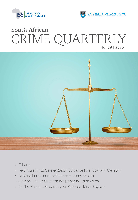
South African Crime Quarterly-SACQ
Advancing knowledge for a safer South Africa.South African Crime Quarterly (SACQ) is an esteemed open-access journal dedicated to the comprehensive examination of crime and justice issues in South Africa. Published by the Institute for Security Studies, SACQ aims to provide a platform for researchers, practitioners, and policymakers to disseminate innovative research, case studies, and theoretical discussions that address the complexities of crime in the region. Since its transition to open access in 2015, the journal has fostered a wider dissemination of knowledge, promoting accessibility for students and professionals alike. With an ISSN of 1991-3877, SACQ stands out as an essential resource, driving informed dialogue and enhancing the understanding of security challenges in South Africa. The journal encourages submissions that contribute to evidence-based practices and policies, making it a vital tool for those committed to addressing crime and improving safety within communities.
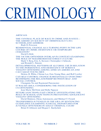
CRIMINOLOGY
Advancing the Frontiers of Criminological Knowledge.CRIMINOLOGY, published by WILEY, stands as a leading journal in the fields of Law and Forensic Medicine, with an impressive impact factor that places it in the Q1 quartile for both categories. With its ISSN 0011-1384 and E-ISSN 1745-9125, this esteemed journal has been at the forefront of advancing knowledge and understanding in criminological theories and practices since its inception in 1963, and continues to be relevant through 2024. As of 2023, CRIMINOLOGY is ranked #19 in Social Sciences_ Law and #19 in Medicine_ Pathology and Forensic Medicine, positioning it within the top 2% of its field, making it an essential resource for researchers and professionals alike. Despite not offering open access, it provides invaluable insights into the complexities of crime, law enforcement, and societal impacts, thus shaping the future of criminological research and policy.

Logos Ciencia & Tecnologia
Connecting academia and industry for transformative advancements.Logos Ciencia & Tecnologia is a distinguished open-access journal dedicated to the fields of science and technology, published by Policia Nacional Colombia. Since its inception in 2009, it has been committed to disseminating high-quality research that addresses contemporary issues in criminology, forensic science, and information technology. With an ISSN of 2145-549X and an E-ISSN of 2422-4200, the journal ensures that vital insights are accessible to researchers, professionals, and students worldwide. The journal aims to foster interdisciplinary knowledge transfer, encouraging collaboration among practitioners and academics to advance innovative solutions for societal challenges. As an integral resource for those in academia and industry, Logos Ciencia & Tecnologia champions the importance of rigorous research in enhancing both crime prevention strategies and technological developments in the region and beyond.

Journal of Criminological Research Policy and Practice
Bridging Theory and Practice in CriminologyJournal of Criminological Research Policy and Practice is a pioneering platform dedicated to the exploration and dissemination of knowledge in the interdisciplinary field of criminology. Published by Emerald Group Publishing Ltd, this journal features high-quality research that addresses contemporary issues and innovative practices in areas such as law, public administration, and social psychology. With an ISSN of 2056-3841 and an E-ISSN of 2056-385X, the journal has garnered a notable presence in the academic community, showcasing a Q3 ranking in Law and Sociology & Political Science as of 2023. The journal provides valuable insights for researchers and practitioners alike, advancing the discourse on criminological policy and its implications for society. It serves as an essential resource for those invested in enhancing social justice, informing policy-making, and understanding the complexities of crime within a broader social context. Encompassing research from 2015 to the present and extending into 2024, the journal stands as a critical reference point for future studies and professional practice in criminology.
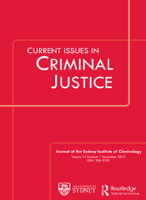
Current Issues in Criminal Justice
Exploring Contemporary Challenges in Criminal LawCurrent Issues in Criminal Justice is a leading academic journal aimed at advancing research in the field of criminal justice, published by Routledge Journals, Taylor & Francis Ltd. With an impressive Q1 ranking in Law and a Scopus rank of #129 out of 1025, placing it in the 87th percentile of its field, this journal is recognized for its significant contribution to scholarly discussion and policy analysis. Covering topics from legal systems, crime prevention, and contemporary justice challenges, Current Issues in Criminal Justice serves as a vital resource for researchers, practitioners, and students seeking to explore pressing issues and innovative solutions within the justice system. The journal's commitment to high-quality, peer-reviewed research ensures that it remains at the forefront of legal scholarship, fostering interdisciplinary dialogue and informing policy development in the United Kingdom and beyond. With access options tailored for academics and practitioners alike, this journal is essential for those invested in the future of criminal justice research.
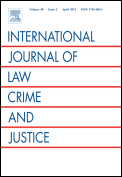
International Journal of Law Crime and Justice
Unveiling Insights into Crime and Justice DynamicsThe International Journal of Law Crime and Justice, published by ELSEVIER SCI LTD, serves as a pivotal platform for the dissemination of cutting-edge research in the fields of law, crime, and justice. Established in 2008, the journal has established itself as a reputable source in its domain, holding a respectable Q2 ranking in Law, Political Science and International Relations, as well as Sociology and Political Science as of 2023. With an impact factor reflecting its influence, this journal ranks favorably within the top percentiles of Scopus in several social science categories, making it a critical resource for scholars and practitioners. The journal promotes open access, ensuring that vital research is accessible to a global audience. Scholars interested in the intricate intersection between legal studies, societal challenges, and crime will find the journal's objectives aligned with fostering knowledge and innovation in this dynamic field. Operating from its headquarters in London, England, the journal continues to invite substantial contributions that address contemporary issues and enhance our understanding of law and justice worldwide.

Trends in Organized Crime
Illuminating Contemporary Issues in Criminal OrganizationsTrends in Organized Crime, published by SPRINGER, is a premier journal dedicated to the exploration and analysis of organized crime phenomena. With an impressive impact factor and ranked in the Q1 category for Law, this journal reflects the highest echelon of scholarly work, positioning itself at the forefront of legal and social sciences research. Established in 1995 and extending its impact through 2024, the journal serves as a crucial resource for academics, practitioners, and policymakers seeking to understand the complexities of organized crime and its implications on society. While not an Open Access journal, it provides robust access options for scholarly articles, making it a vital tool for those engaged in legal studies and criminology. By fostering interdisciplinary dialogues, Trends in Organized Crime aims to illuminate contemporary issues, promote innovative methodologies, and enhance the collective understanding of criminal organizations globally.